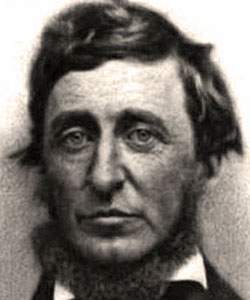Henry David Thoreau, Character (American National Biography)
Scholarship
The popular image of Thoreau as cold and negative was created in large part by his friend Emerson, who saw Thoreau as stoic and therefore overemphasized these qualities in both his eulogy and in his subsequent editing of Thoreau's letters. There is no question that Thoreau could at times be crusty, abrupt, and cantankerous. His friend Caroline Sturgis Tappan once said that he "imitates porcupines successfully." He loved to deflate the pompous and disturb the conservative. But on the other hand, he was a loving son and a thoughtful brother. The Emerson children adored him, as did most Concord children, who loved to hold his hand during walks, visited him at his Walden cabin, brought him natural history specimens for his collections, and plied him with questions because he was one of the few adults who would try to answer them. He also regularly risked arrest to assist escaping slaves on their way to freedom. Despite Thoreau's occasional grumpiness, he was, as Henry Canby has suggested, the happiest of all the Concord writers.
Walter Harding, "Thoreau, Henry David," American National Biography Online, February 2000, http://www.anb.org/articles/16/16-01635.html.
Henry David Thoreau, Writer and Walden (American National Biography)
Scholarship
To help Thoreau establish contacts in the publishing world of New York City, Emerson arranged for him to tutor the children of Emerson's brother on Staten Island. There Thoreau became acquainted with Horace Greeley, editor of the influential New York Tribune, who soon became his literary agent, helping him place his essays in various periodicals and touting him regularly in the Tribune….
In the autumn of 1844 Emerson purchased a small tract of land on Walden Pond on the outskirts of Concord to protect its wooded beauty. The following spring, with Emerson's permission Thoreau built a ten-by-fifteen-foot cabin there at the cost of $28.121⁄2 and moved in on 4 July 1845 with the intent of devoting himself to the completion of his book for John. By simplifying his life, Thoreau found he was able to live comfortably on as little as twenty-seven cents a week, which he could earn by working only six weeks a year. Thus he was able to devote most of his mornings to writing at his desk, his afternoons to exploring the woods and fields of Concord, taking note of the circle of the seasons, and his evenings to socializing with friends such as Emerson and Bronson Alcott, who by now had settled in Concord, and his family.
Thoreau was scarcely a hermit at Walden. There was rarely a day when he did not either visit in town or receive his friends at Walden, only little more than a mile from Concord.
In the autumn of 1844 Emerson purchased a small tract of land on Walden Pond on the outskirts of Concord to protect its wooded beauty. The following spring, with Emerson's permission Thoreau built a ten-by-fifteen-foot cabin there at the cost of $28.121⁄2 and moved in on 4 July 1845 with the intent of devoting himself to the completion of his book for John. By simplifying his life, Thoreau found he was able to live comfortably on as little as twenty-seven cents a week, which he could earn by working only six weeks a year. Thus he was able to devote most of his mornings to writing at his desk, his afternoons to exploring the woods and fields of Concord, taking note of the circle of the seasons, and his evenings to socializing with friends such as Emerson and Bronson Alcott, who by now had settled in Concord, and his family.
Thoreau was scarcely a hermit at Walden. There was rarely a day when he did not either visit in town or receive his friends at Walden, only little more than a mile from Concord.
Walter Harding, "Thoreau, Henry David," American National Biography Online, February 2000, http://www.anb.org/articles/16/16-01635.html.
Henry David Thoreau, Transcendentalism (American National Biography)
Scholarship
Shortly after Thoreau's return from Harvard, he became acquainted with Ralph Waldo Emerson, who had recently settled in Concord. As leader of the American Transcendentalists, Emerson introduced Thoreau to his friends and their ideas. Convinced of Thoreau's budding genius, Emerson urged him to embark on a literary career, suggesting that he start by keeping a journal. Although he had made a few sporadic attempts before at keeping a journal, Thoreau on 22 October 1837 thus began the daily journal that he continued throughout the remaining twenty-five years of his life. Emerson saw to it that many of Thoreau's early essays and poems were published in the Transcendentalist Dial (1840-1844) and in 1841 invited him to join the Emerson household, ostensibly as a handyman but primarily to give him time to write.
Thoreau for a time idolized Emerson, but later, as Thoreau saw Emerson as more conservative and less challenging in his viewpoints and tired of being dismissed as an imitator of Emerson, the ardor of their friendship cooled. However, there was never a complete break between the two, and in later years they grew close again.
Thoreau for a time idolized Emerson, but later, as Thoreau saw Emerson as more conservative and less challenging in his viewpoints and tired of being dismissed as an imitator of Emerson, the ardor of their friendship cooled. However, there was never a complete break between the two, and in later years they grew close again.
Walter Harding, "Thoreau, Henry David," American National Biography Online, February 2000, http://www.anb.org/articles/16/16-01635.html.





